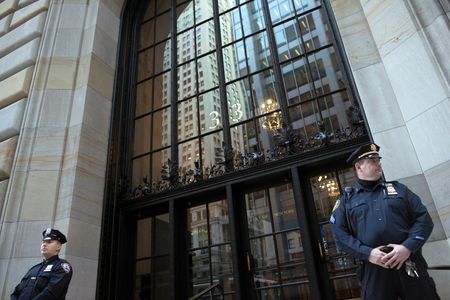 1
1 1
1
By Michael S. Derby
NEW YORK (Reuters) – The New York Fed’s in-house economic forecasting model is predicting a notably brighter economic future for the U.S. relative to three months ago, the bank said Friday.
The model, which the bank stresses is not an official projection of the bank but a tool for policymakers to use, now sees U.S. growth rising by 1% this year, up from a 0.2% projection in March.
The model also sees slightly higher inflation, with the core personal consumption expenditures price index – it’s stripped of food and energy factors — rising by 3.7% this year versus 3.5% in the last set of projections. Hitting 2% inflation, the Fed’s goal, is projected to happen by the close of 2025.
The bank tied the upgraded outlook to an improvement in longer-run inflation expectations, which bank analysts said affected productivity measurements, in turn boosting the growth estimate.
“Were it not for this data point, output and inflation projections would be a lot closer to those in March, with inflation actually a bit stronger throughout the horizon and output growth higher only in the short term,” New York Fed economists wrote on the bank’s website. “While the dependence of the forecast on one data point makes us uncomfortable, we chose to follow standard practice and incorporate it in the projections. Nonetheless, this dependence should be kept in mind.”
The revised New York Fed forecasts come just two days after the central bank decided to hold off on an interest rate rise for the first time since it started rocketing short-term rates higher in March 2022. As part of the Federal Open Market Committee meeting, officials also released forecasts that showed higher expectations of growth and unemployment rises, while flagging expectations for further inflation declines.
The upgraded Fed forecasts come as the economy has shown unexpected resilience in the face of aggressive rate hikes. The tightening cycle has been dogged by fears that central bank actions would send the economy into a recession and at points models like the New York Fed’s have predicted contracting activity, even as they’ve now shifted gears toward strength.
Fed officials have long expressed confidence they could get inflation under control without causing undue pain, but that positive outlook has at points clashed with the view of central bank staff.
Meeting minutes from the Fed’s March policy meeting noted that at the Board of Governors, “the staff’s projection at the time of the March meeting included a mild recession starting later this year, with a recovery over the subsequent two years.” Fed staff maintained that view at the May FOMC meeting, the minutes from that gathering noted.
The New York Fed model also said that the level of interest rates that’s neutral in its impact on the economy rose in its June estimate to 2.2% from March’s 2%, while it eases to 1.8% next year.
(Reporting by Michael S. Derby; editing by Jonathan Oatis)